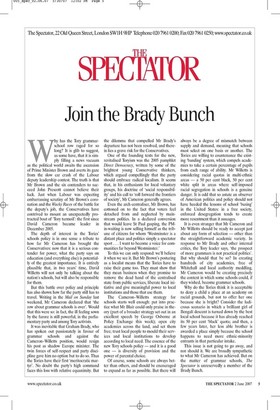Join the Brady Bunch
Why has the Tory grammarschool row raged for so long? It is glib to suggest, as some have, that it is simply filling a news vacuum as the political world awaits the ascension of Prime Minister Brown and averts its gaze from the slow car crash of the Labour deputy leadership contest. The truth is that Mr Brown and the six contenders to succeed John Prescott cannot believe their luck. Just when Labour was expecting embarrassing scrutiny of Mr Brown's coronation and the Wacky Races of the battle for the deputy's job, the Conservatives have contrived to mount an unexpectedly protracted bout of 'Tory turmoil': the first since David Cameron became leader in December 2005.
The depth of interest in the Tories' schools policy is in one sense a tribute to how far Mr Cameron has brought the Conservatives: now that it is a serious contender for power, what the party says on education (and everything else) is potentially of the greatest importance. It is entirely plausible that, in two years' time, David Willetts will not only be talking about the nation's schools, but will also be responsible for them.
But this battle over policy and principle has also shown how far the party still has to travel. Writing in the Mail on Sunday last weekend, Mr Cameron declared that `the row about grammar schools is over'. Would that this were so: in fact, the ill feeling sown by the furore is still powerful, in the parliamentary party and among Tory activists.
It was inevitable that Graham Brady, who has spoken out passionately in favour of grammar schools and against the Cameron–Willetts position, would resign his post as shadow Europe minister The twin forces of self-respect and party discipline gave him no option but to do so. Thus the Tories have their first `meritocratic martyr'. No doubt the party's high command faces this loss with relative equanimity. But the dilemma that compelled Mr Brady's departure has not been resolved, and therein lies a grave risk for the Conservatives.
One of the founding texts for the new, revitalised Toryism was the 2005 pamphlet Direct Democracy, written by some of the brightest young Conservative thinkers, which argued compellingly that the party should embrace radical localism. It seems that, in his enthusiasm for local voluntary groups, his doctrine of 'social responsibility' and his call to 'roll forward the frontiers of society', Mr Cameron generally agrees.
Even the arch-centraliser, Mr Brown, has cottoned on to the fact that voters feel detached from and neglected by mainstream politics. In a declared conversion that would leave St Paul gasping, the PMin-waiting is now selling himself as the tribune of citizens for whom 'Westminster is a distant place and politics simply a spectator sport. . . I want to become a voice for communities far beyond Westminster.'
To this we can only respond: we'll believe it when we see it. But Mr Brown's posturing as a localist means that the Tories have to raise their game too. They must show that they mean business when they promise to remove the dead hand of the centralised state from public services, liberate local initiative and give meaningful power to local institutions and those that use them.
The Cameron–Willetts strategy for schools starts well enough: put into practice what Mr Blair could only praise in theory (part of a broader strategy set out in an excellent speech by George Osborne at Policy Exchange this week); open city academies across the land, and set them free; trust local people to mould their services and local institutions to develop according to local need. The essence of the new Tory schools policy — and it is a good one — is diversity of provision and the power of parental choice.
Of course, some schools are always better than others, and should be encouraged to expand as far as possible. But there will always be a degree of mismatch between supply and demand, meaning that schools must select on one basis or another. The Tories are willing to countenance the existing 'banding' system, which compels academies to take a certain percentage of pupils from each range of ability. Mr Willetts is considering racial quotas in multi-ethnic areas — a 50 per cent black, 50 per cent white split in areas where self-imposed racial segregation in schools is a genuine danger. It is odd that so astute an observer of American politics and policy should not have heeded the lessons of school 'busing' in the United States: in a free society, enforced desegregation tends to create more resentment than it assuages.
It is even stranger that Mr Cameron and Mr Willetts should be ready to accept just about any form of selection — other than the straightforward academic variety. In response to Mr Brady and other internal critics, the Tory leader says, 'the prospect of more grammars is not practical politics'. But why should that be so? In creating hundreds of city academies, free of Whitehall and local authority meddling, Mr Cameron would be creating precisely the context in which some schools could, if they wished, become grammar schools.
Why do the Tories think it is acceptable to deny a child a place at an academy on racial grounds, but not to offer her one because she is bright? Consider the ludicrous scenario in which a brilliant girl of Bengali descent is turned down by the best local school because it has already reached its 50 per cent 'black' quota; and then, a few years later, her less able brother is awarded a place simply because the school happens to need more ethnic-minority entrants in that particular intake.
This issue is not going to go away, and nor should it. We are broadly sympathetic to what Mr Cameron has achieved. But on the matter of grammar schools, The Spectator is unreservedly a member of the Brady Bunch.




















































 Previous page
Previous page